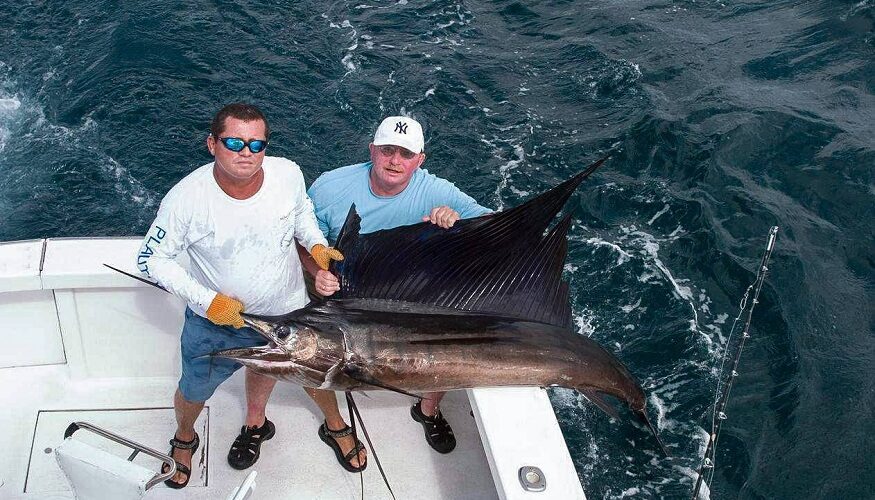Costa Rica, a haven for diverse marine life and stunning landscapes, has become an epicenter for sport fishing enthusiasts worldwide. While the adrenaline rush of battling a Marlin or the tranquility of reeling in a Snook is evident, there’s a bigger picture to consider. Sport fishing in this Central American paradise is not just a pastime; it significantly boosts the economy and fosters environmental conservation. Dive in as we explore the symbiotic relationship between sport fishing, the economy, and the environment.
Top 10 Reasons How Sport Fishing Benefits Costa Rica:
Nestled between two oceans, Costa Rica is a magnet for sport fishing enthusiasts from around the globe. The country’s shimmering waters, teeming with a diverse range of marine life, present both a challenge and a delight to anglers. But beyond the thrill of the chase and the satisfaction of a good catch, sport fishing plays a pivotal role in shaping Costa Rica’s socio-economic and environmental landscape. As we delve deeper, it’sevident that the line between angling and the nation’s prosperity is intertwined.
Here are the top ten reasons highlighting the profound impact of sport fishing on Costa Rica.
1. Boosts Tourism:
Sport fishing draws thousands of tourists annually. With a unique array of fishes in Costa Rica, many international anglers make it a priority destination. This influx of tourists leads to higher revenues from accommodation, dining, and local attractions, bolstering the nation’s economy.
2. Creation of Job Opportunities:
The sport fishing industry has given rise to numerous job opportunities. From fishing charter crews and local fishing guides to equipment rental and maintenance services, the demand for skilled professionals in this domain has surged, providing stable income sources for local communities.
3. Promotes Sustainable Fishing Practices:
Sport fishing in Costa Rica emphasizes catch-and-release techniques, which ensure the fish’s survival post-catch. Promoting these sustainable methods contributes to maintaining a balanced marine ecosystem and conserving fish populations for future generations.
4. Encourages Environmental Awareness:
The thrill of sport fishing also brings an understanding and appreciation of the marine ecosystem. As anglers learn more about fish habits and habitats, they advocate for marine conservation, ensuring the ocean’s bounty remains for generations.
5. Enhances Local Infrastructure:
With the surge in sport fishing tourism, there’s an increased demand for better infrastructure. From improved roads and ports to the development of modern fishing facilities, these enhancements serve tourists and uplift the local community’s quality of life.
6. Generates Government Revenue:
Licensing and permitting fees for sport fishing provide significant revenue for the Costa Rican government. These funds are often reinvested in conservation projects, marine research, and other initiatives that benefit the environment and the economy.
7. Reduces Overfishing:
Sport fishing diverts attention from large-scale commercial fishing, reducing overfishing pressure. By catching selectively and often releasing, sport fishing promotes a healthier marine ecosystem, allowing species to regenerate and thrive.
8. Strengthens Community Bonds:
Sport fishing tournaments and events foster a sense of community. They create platforms for locals and tourists to interact, share knowledge, and celebrate the rich marine heritage of Costa Rica. These events often lead to collaborations that benefit local conservation and social initiatives.
9. Supports Local Businesses:
The ripple effect of sport fishing tourism is extensive. Local artisans, restaurants, and shops see a spike in business as tourists often wish to take home souvenirs and indulge in authentic Costa Rican cuisine. This direct support to small businesses is vital for the local economy.
10. Enhances Research and Development:
The attention and revenue from sport fishing often channel into marine research and development. Studies on fish behaviors, migratory patterns, and habitat conservation lead to better fishing practices and a deeper understanding of the marine ecosystem.
Conclusion:
Sport fishing in Costa Rica is more than an exhilarating pursuit; it’s a cornerstone that bridges economic prosperity with environmental sustainability. As we’ve seen, the impacts of this activity echo throughout communities, government initiatives, and conservation efforts. So, the next time you consider a fishing expedition, know you’re contributing to a more significant cause. And what better way to immerse in this experience than by staying at a luxury Villa in Costa Rica, merging comfort with the untamed beauty of nature? Embrace sport fishing, where the thrill of the catch meets the heart of conservation.

